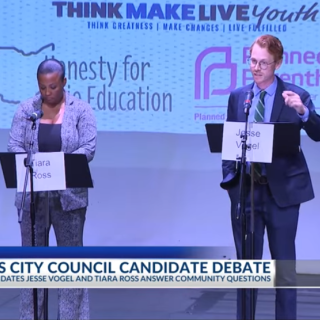Maddening media misconceptions
1. Can the media, popular culture mavens, and politicians begin to remember yesterday? Or last week, last month, six months, one year, four years, two decades, etc., let alone a significant amount of historical time? They need to remember the Trump Agenda and its damages—economic, health, civic, unemployment, inflation, racism, violence, divisiveness, for example; and cease unsupported comparisons with Ronald Reagan/ism, Jimmy Carter, Bill Clinton, LBJ, FDR, and so on.
2. Avoid the myth of the “educated American.” Understand today’s failure of American education, especially the dramatic expansion of nonpublic schooling and STEM, decline of history and civics, but still recognize that there was never a golden age to which to return.
3. Understand and attempt to counteract the admitted decline of the media and the “rise” of unregulated social media: the decline of “independent” and “legitimate” journalistic reporting press (including “standards” and “ethics”) across media and platforms; the rise of sensationalism and the “opinion economy” (the replacement of news reporting by un-fact-checked, unedited “opinion (and guest) writers”; corporatization of newspapers and broadcast stations; unregulated digital social media often connected to right-wing broadcast media and foundations; and the refusal of the supposed nonpartisan or apolitical, unregulated Facebook/Metaverse, Google, Instagram, etc., to police their sites.
4. Actively combat the combined fear and ignorance of inclusive, documented, and professional history: from the complicated and contradictory, “divisive,” “uncomfortable,” “shaming” and “blaming,” “political,” replaced or “put behind us” by the combination of rewriting, white-washing, passage of time, and “recent events.” See for a major example the “response” to the 1619 Project in the form of the 1620, 1776, and 1836 “projects” and the dishonest vilification and efforts to ban the 1619 Project from school curricula.
5. Admit and address the absence of historical knowledge or historical memory writ large (not to be confused with professional history).
6. Confront and combat the ignorance of the Constitution and especially the texts of the First, Second, Emancipation, Women’s Suffrage, and Civil Rights Amendments; case law and court decisions (not to be confused with legal scholarship). This is the combined result of failure to teach civics, of media ignorance, and of politicians’ distortions (despite many of them graduating from major laws schools).
7. Acknowledge and correct the politicians’ and others’ common inability to do simple arithmetic (not to be confused with mathematics or statistics): common confusion of “trends” and numbers with percentages, ignorance of sample sizes and elementary (high school level) statistical significance. For example: Covid cases, tests, vaccinations and comparisons across subgroups; economic data and trends; voting data; and opinion polls.
Avoid these especially glaring and misleading examples
8. Presumption of continuing and long-term trends from one or two data points, only a few days or a few weeks apart—across political, economic, social, and cultural issues.
9. Misrepresenting Biden’s “decline” in approval ratings over a very short span of time, which are still higher than Trump’s in four years in office.
10. Misreading opinion polls and surveys in a meaningful, critical, comparative, or chronological context. Instead, acknowledge their limits, consider their sponsors, note sample sizes, review the questions for their biases (not to be confused with political science).
11. Confusing “conservative” with right-wing ideologues (not requiring a Ph.D. in political science or history). Conservatives respect facts and believe in debate, tolerance, most human rights, limited government, not banning everything with which they disagree. Right-wing ideologues, activists, and followers do not.
12. Ahistorical redefinition of “liberal” as “left” rather than moderate or centrist. This is a largely unacknowledged and unexamined process since at least Reaganism of the 1980s. In its narrowing of the “acceptable” political spectrum, it is damaging to democratic (small “d”) politics.
13. Making false, illogical, and counterfactual distinctions between the “social” and the “political,” even confusing the “social” with socialism. These are false oppositions, rooted in a combination of ignorance and ideology. In the U.S., unlike almost all the world, students study political science, which is never scientific. Elsewhere, the more inclusive subject is political economy. At Oxford and Cambridge, a distinctive major area is PEP: politics, economics, and philosophy.
14. Undocumented, ahistorical, and illogical presumption and rhetorical practice of false equivalency (not requiring advanced degrees in philosophy or rhetoric), especially among right-wing and “conservative” but also moderate and progressive opinion writers. It occurs most commonly in this form: If there are extremists on the right, then there must the same or similar on the left, without examples or definitions. For example, teaching about race; confusion of right-wing radicals with progressive Democrats; ignorance of real world meanings and representatives of “socialism” and “communism”; confusion of “defunding the police” with rethinking public safety; ignorant expectations that history can be or should be “apolitical,” that is, having no point of view or bearing no necessary relationship to the times in which it is written.
15. Inability to differentiate within and between superficially defined groups: whites, nonwhites, blacks, Hispanics/Latinos/Latinx, Asian Americans and Pacific Islanders, evangelicals, moderates, progressives, socialists, conservatives, right-wing, independents, and others.
16. The “new” racism and the “old”: a) the inability to acknowledge racism as both continuing and increasing; b) the conflation of skin color, ethnic and geographical background, and being “American”; and c) major confusion of persisting centuries- and decades-old racism with recent surges in hate and violence, most visibly but not solely addressed to Asian Americans and Pacific Islanders, who are themselves a diverse group.
From myth to misinformation across the media-scape
17. Avoid the near certainty about the “expected” results of 2022 and 2024 elections based on supposed “historical” precedents that are not comparable or comprehensive; on “yesterday’s” opinion polls (if that); and on the popularity of Biden’s policy agenda.
18. Reconsider presumption of Trump’s “near total control” over the Republican Party. This presumption ignores daily defections from the party’s registered voters; the stream of criticism from former prominent Republicans, some of whom have left the party and some of whom remain within the party; and the careful distancing of many Republican candidates for office, especially statewide and national office. This presumption also ignores a reputable poll that found 59% of registered Republicans who voted for Trump in 2020 stated they felt strong pressure “as Republicans” to reply that they believed Trump “won” the election when they did not necessarily believe it. The poll by CNN was initially publicized in September but quickly forgotten.
19. Avoid generalizing about “the economy” without serious or systematic attention to data, trends, historical or comparative context or precedents (not requiring a Ph.D. in economics or public policy). Do not follow blindly the latest Washington Post, New York Times, Wall Street Journal opinion or “guest” essay or press release from the American Enterprise Institute, Brookings Institution, Center for American Progress, or other self-proclaimed “think tank” (now a oxymoronic term).
20. Reject the rhetoric of the “Great Retirement” without differentiating clearly between temporary, short-term, long-term (“leaving”), or permanent withdrawal (“retirement” as we usually define the word) from the workforce, and without taking into account child care or safety issues, especially in the occupations “losing” the most workers.
21. Stop repeating the undocumentable claims about the “lowest level of unemployment in 60 years” (most often based on numbers of individuals filing new claims) when unemployment benefits have run out for so many as well as the poorly understood millions in the pseudo-“great retirement.” Unemployment benefits were limited first by many states and then the federal government to shorter periods than many economists or social commentators have recommended. Simultaneously, pay attention to changing definitions and measures of unemployment over more than one-half century; we cannot compare directly the numbers from the 1960s and the 2020s.
22. Take much greater caution in reporting or presuming the dangers of inflation.This includes distinguishing when inflation is ordinary, not harmful, a historical pattern, or a significant problem. Consult more than one “expert” or politician.
23. Be very careful in asserting that crime is raging, wavering, or receding. Acknowledge the different documentation, visibility, and perceptions of the dangers and consequences of homicide, theft, traffic deaths, or violations by law enforcement. Read crime statistics with great care.
24. Take greater care in discussing the“shortage” of oil and other fuel supplies v. control, volume, or price by Big Oil without governmental regulation.
25. Provide sensible discussion about partisan concern about the “politicization” of the judiciary by majority Democrats. The issue today follows Mitch McConnell’s years of blocking Democratic nominations and aiding the confirmation of Trump’s nominations of three SCOTUS and more than 200 federal court appointees. Recognize that the size of various benches is not set permanently in any “founding” documents but has changed over time.
26. Conduct elementary research and reinforce responsible reporting on the nondebate “raging” over critical race theory and “protesting parents” railing over teaching about race in schools. The simple and undisputed facts are that critical race theory (a subject overwhelmingly taught in law schools) is not taught in K-12 schools, that there is no “debate raging or roaring” about it anywhere other than the right-wing propaganda machine, and that there are only a handful of documented cases of parents protesting at school boards (and never citing examples of their own children’s classes). The “mainstream media” perpetuate lies, despite the efforts of serious students to reach reporters and opinion writers with little success.
27. Report responsibly issues relating to “canceling,” “cancel culture,” and banning. Especially based on ignorance and the “new” illiteracy, today’s new banners refuse to read the contents of books they wish to remove or destroy. The media continue to report uncritically the right-wing campaigns of unconstitutional censorship; the assault on documented and inclusive history; representations of women, minorities, vulnerable populations, and the differently gendered and abled. Indiscriminant, distorted and dishonest, and ridiculous talk of “canceling” Dr. Seuss books by the owners of the copyright, Mr. and Mrs. Potato Head, and the MLB All Star Game gain far too much print space and air time. False equivalency plays loosely and uncontrollably across media and political spheres.
28. Stop invoking “woke” out of context and without definition. “Woke,” historically, is a term of praise in post-1960s American black culture. It has nothing to do with liberals, progressives, Democrats, socialists, and so forth. It is a simple word, easy to spell and pronounce, loathed with typical ignorance by the right-wing ideologues and activists. It is equally easy for the media to invoke uncritically. It shares those qualities with “critical,” “race,” and “theory,” especially race, as well as “equity” and “climate change.” Is this the “new” or the “old” racism? It is neither liberal nor conservative.
29. Mandate well-publicized corrections; they rank high among the forgotten elements of newspapers and other media that cry out for resurrection.
30. Last but not least: Stop ignoring use of the dictionary and thesaurus online or in print. In the absence of copy desks and copy editors, instruct all parties about spell check and grammar check features on virtually all word processing programs.
My wish list is far from complete but my fingers are tired and my editor sets limits….
---------------------------------
Harvey J. Graff is Professor Emeritus of English and History and Ohio Eminent Scholar at The Ohio State University. He is the author of many books on social history including The Literacy Mythand The Dallas Myth. His specialties include the history and present condition of literacy and education including higher education, children and families, cities, interdisciplinarity, and contemporary politics, culture, and society.



